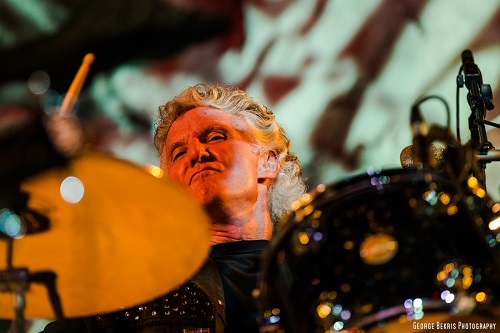By Shawn Perry
Of all the key rock and roll 50th anniversaries celebrated over the last couple of years, one that came through town in 2019 was the “50 Years Of Funk Tour,” celebrating the five decades of Grand Funk Railroad. While GFR experienced more than its fair share of ups and downs during their prime, these days the current lineup — original founding members Don Brewer (drums) and Mel Schacher (bass), joined by singer Max Carl, guitarist Bruce Kulick, and keyboardist Tim Cashion — play cruises, casinos, fairs, and theaters. The set list comprises hits like “We’re An American Band,” “The Loco-Motion,” and “Some Kind of Wonderful,” which was released 45 years ago.
For 2020, the group is marking the occasion with the “Some Kind Of Wonderful Tour.” They’ll play all over the United States throughout the year. Unfortunately, there are no plans in 2020 for reissues, box sets, compilations or new music. So when I spoke with Don Brewer, whom I’ve interviewed previously, I decided to plunge right into the band’s unique history. In past interviews, I asked Brewer about the salad days of albums like We’re An American Band, Shinin’ On, and All The Girls In The World Beware!!! This time, I decided to zero in on the early days.
In the following exchange, we get into matters fans of the band’s first era would care about — the infamous appearance on Playboy After Dark, the concert at Shea Stadium, others drummers, Live Album, Survival and E Pluribus Funk. Of course, I was obligated to ask about “Some Kind of Wonderful,” and the result was a great story about the song’s author. And then, there was inevitable Mark Farner reunion question. You’ll have to read to the end to find out what the drummer has to say about that. In the meantime, catch Grand Funk Railroad when they come through your town because they’ll help you party it down.
~
Last year, Grand Funk celebrated their 50th anniversary and this year you’re celebrating the 45th anniversary of “Some Kind of Wonderful” with an extensive tour. I looked at your calendar for the next year. Looks like you’re going to be pretty busy.
Yeah, yeah, we’re going to get going here, and yeah, we’ll go all year.
Are you just planning to stay within the United States?
Right now, everything we have is here in the United States. There may be a Canadian show that pops up along the way. We’re kind of getting a little bit out of cruise territory now unless we do it at the end of the year. We’ll see. You never know.
Do you have anything special planned for any of these shows?
Every night is special (laughs). It’s always a special evening when we get out there. And you know, we just like to get the audience cranked up and we love to play the hits for everybody and that’s really what we do. The band we have right now is just a terrific band. We’ve been touring with this particular incarnation of the band now for 20 years, which is unheard of. I don’t think I can name any bands that have been together for 20 years.
Well, maybe ZZ Top and a couple of others.
(Laughs) Let’s say, I don’t know any bands that have stayed together for 20 years that still travel together.
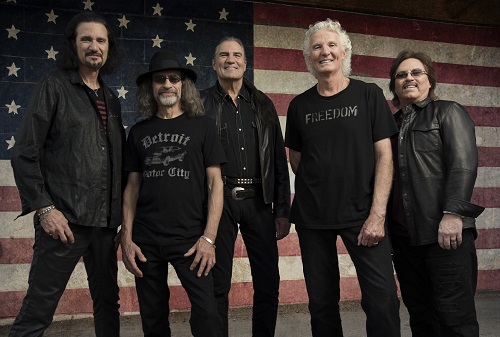
The last couple times we spoke, we touched on Grand Funk’s milestones, beginning with “We’re An American Band.” This time, I want to go back a little further. What initially excited me about the band was when I was just a young kid in the early 70s, I heard that red album (Grand Funk) and I heard Closer to Home and I heard Live Album. I was just knocked out by that stuff. It’s so pure, raw, magical — the band and the whole vibe of that period. Can you share some thoughts with me just briefly about that time?
We were just these three kids from Flint Michigan that had a dream to be in a big rock and roll band. We weren’t the greatest musicians. We didn’t have the greatest songs. We didn’t have the greatest anything. But when we were together as a unit…And you’re right — it was magical. there was there was a certain kind of a thing going on. We all were on the same page. It just gelled. And that’s where that music came from.
When I listen to those earlier those early albums — On Time, Grand Funk and Closer to Home — especially those three, it’s honest rock and roll. There’s hardly any overdubs. Every now and then there’s a rhythm guitar in the background or something, but it’s just real rock music the way it’s supposed to be and that’s what I love about it. A lot of people comment, “Oh the recordings weren’t that good.” Well, no recordings weren’t that good (laughs). The recording techniques at that time weren’t that good. To me, recording is all about capturing a song and a performance, and that’s what those recordings did.
I was tracking through the red album (Grand Funk) last night. I think it sounds great myself. And I know technically it’s not up to speed with a lot of stuff that came out later. Live Album, of course, is just so raw. I just love that record.
A guy asked me last week about that and that is a real live recording. We did three shows and there’s not a single overdub anywhere — not one. That’s another thing that’s unheard of. People always talk about these live albums — well, they’re all canned. They take them in and they fix all the vocals, they add keyboards and background stuff. But there’s nothing — those recordings are pure.
You guys made a interesting appearance around that time on the show Playboy After Dark.
The funny thing is a few years ago, somebody pointed that out to me, the Playboy After Dark thing, and I don’t remember doing it. I don’t have any recollection of ever doing that. It was a time when we were running around the country all over the place. I do remember that there was another one that was on a public broadcast station. And that one popped up somewhere along the line and I do remember doing that one. It was one of those things where we had played a show the night before. We got in a car and Terry (Knight) had us set up to do this TV show in the middle of the afternoon. And then after we left the TV show, we went and played another gig someplace else. It was one of those kind of things.
I’m sure you know, there’s just tons of video of Grand Funk on YouTube. Of course, the one that everybody wants to see, as I’m sure you know, is the complete Shea Stadium show. When we last spoke, you told you have the whole show on video.
Yeah.
Is it all edited?
Yeah, it’s a finished deal. You know the sound again, you would probably love the sound because it’s real, it’s raw, it’s actually the sound of us on stage. I took it and had it digitized and had it put on CD and a couple other things because the film was actually getting bad. I took it to a place up in New York and had everything restored. And, so yeah, it’s all done. We transferred it over to the digital form. We’ve got it saved and it’s a beautiful piece. One of the engineers who was working on it said, “God you guys, the band, were really tight.” And, you know, we were at that time. We had just finished a tour of Europe. When we came back and did that show, we were tight and it’s a good show.
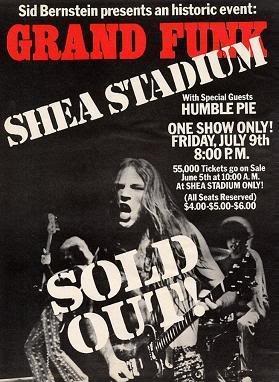
Oh man, you’re killing me. You have got to put that out! Obviously by restoring it and preserving it, you have some desire for it to be seen by the public at some point in time. Are you looking at that at all?
We haven’t been approached by anybody to put it out. You know, I remember a couple of people that were poking around. This was years ago. “Well, what do you guys have? You must have some stuff in the can.” We sent them a version of it that was fixed, so they couldn’t bootleg it or take it. So they listened to it and their comment was: “You don’t have none of the hits on it.” (Laughs) At the time, we had hits — “Footstompin’ Music” and “Closer to Home” — those are on there. But, of course, “American Band” is not on there, “Loco-Motion” is not on there, “Some Kind of Wonderful” is not on there. So, this guy was like, “You don’t have hits on there.” “Well, we weren’t playing the hits. Those hits didn’t exist at that time.”
That’s what makes Grand Funk Railroad such a great band. You guys had these different eras. You started out as this incredible underground band that blew Led Zeppelin off the stage and then you had the “commercial years,” for lack of a better term. That’s what makes the story of Grand Funk so awesome. I know you did Behind the Music back when you reunited in the late 90s. Maybe it’s time for a more comprehensive documentary with some of the Shea Stadium stuff. I mean, the historical significance of Grand Funk Railroad is undeniable.
You have to tell that to the Rock and Roll Hall of Fame.
I was going to ask you about them. I know it doesn’t look good. But hey, you know bands like T-Rex and Roxy Music got in. Grand Funk was bigger than those bands. I mean, you had far more impact than those bands and they’re great bands. I know it’s very political. Switching gears, in the early 70s, you were rated right up there as a drummer with John Bonham, Ian Paice, Keith Moon, all these English guys. I can’t really think of another American that was doing what you were doing back then. Did you ever interact with any of those guys?
I would have loved to have met John Bonham. I have the utmost respect for that guy. He played in such a way that nobody, absolutely nobody, not even his son, can imitate the way he played or the way he sounded. You can hear guys cop his licks, but it’s not it. So he had it. I have the utmost respect for that guy and I would have loved to have met him. Keith Moon, I never crossed paths with him either, but that would have been fun.
Something else about those early days and your drums I’d like to ask you about. You did this record after Live Album called Survival, which I’ve always found to have sort of this ethereal sound. I read you weren’t too happy with the sound of your drums on that one. Is that right?
(Laughs) Well, you know it was at the time the Beatles had come out with some new stuff. Terry, our producer and manager, was trying to go after that sound. What we found out later was, you know, it wasn’t towels on the drums that made the drums sound that way, it was comprehension. But somebody heard that they had used towels, so we used towels. I hated that. I hated playing drums like that. I hated the way they sounded. They sounded just like what you would think they would from the towels. I thought the album was fairly good. It had a lot of character I felt.
There’s one song on there that you sing called “I Can Feel Him In The Morning.” Where did that one come from?
At that time, the whole thing was the Vietnam War. I remember I was in Michigan and I was reflecting in my head. Maybe I heard that one of my friends or a friend of a friend had died in Vietnam, something like that. I was very sort of depressed about it. I was writing a song based on what it must feel like to be in a war and the spiritual connection that that brings out in people. That’s what I was feeling…I can feel him…take me out to the battlefield. It was a very scary time for people and really that’s what I was writing the song about.
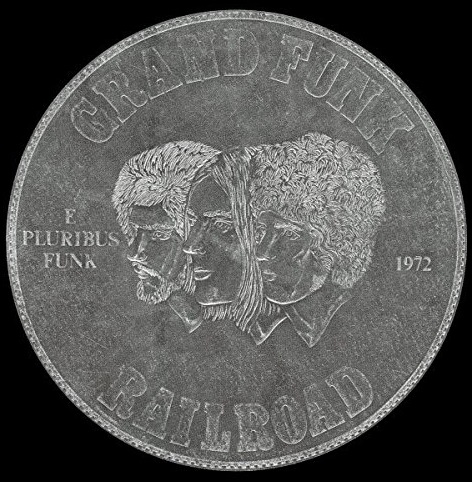
You did one final album with Terry Knight called E Pluribus Funk. The cover art, which, in these days of the vinyl revival, is a real collector’s item. I see people selling sealed versions for up to $500.
Wow. E Pluribus was one of my favorite albums, still is. It had Shea Stadium on the back and, as I told you before when the engineer was listening to the Shea Stadium stuff, he said, “Man, you guys were tight.” I think when we went in and did E Pluribus, we were tight, very tight. We had actually done “Footstompin’” for the Survival album. And it was with that drum set that had the towels on it and it sounded like crap. It just didn’t make it. So we decided we’d retry it and when we put “Footstompin’” on there, there it was. It was like — it’s smoking. The drums and the bass together, and Mark’s keyboards on the Hammond and the guitar and all this stuff. It’s really gelling. And on “I Come Tumblin’,” I think the band is just smoking. My memory of albums is like — was it like pulling teeth to get the tracks out or did it happen very easily? That’s one of the ones that happened easily. It was like two or three takes and we were done. Like I said, the band was tight. We knew what we wanted. We went in, we got the takes finished, and then we were done.
“We’re an American Band” was kind of your coming out party as far as becoming a major voice of the band. You took the lead vocals on the title track, which was your first Number One hit, along with the follow-up single “Walk Like a Man,” and my favorite song on that album, “Black Licorice.” This led to more singing on “Shining On” and “Some Kind of Wonderful,” a song you told me previously started out as a warm-up for the group, but then your manager suggested you record it. I bet John Ellison appreciated that.
(Laughs) We met John not too long ago. We played a show in upstate New York in Syracuse. I think he’s got a place in Rochester and we played this casino. He came to the show and we didn’t know he was coming. This was recent, a year or so ago. He’s jumping up and down, and he sent a note backstage and our stage guy says, “John Ellison is here.” I go, “Where do I know that name Ellison?” And he said, “Some Kind of Wonderful.” So we brought him up on stage and introduced him to the crowd.
He told the story about how he wrote the song, which was just hysterical. He was dating this girl and he couldn’t afford a good car, couldn’t afford anything — “I don’t need a whole lot of money. I don’t need a big fine car.” Well, he’s driving around in the car and you can see the pavement as you’re driving along. You can see through the floor because the floor was rusted out. He was dating this girl, and she loved him anyway, so he wrote the song about her — “You are some kind of wonderful.” He wrote the song about that girl and it was funny the way he told the story.
Yes, we used to sing that song in the back of the car when they would pick us up at the hotel and they were taking us over to venue for the show. We’d sing the song a-capella in the back of the car, and our manager said, “You guys should do that song.” “You’re right. We should do it.”
It certainly worked out for you and I would imagine John Ellison was able to buy a new car.
Yeah, he got a couple of houses. That was the other part of the story. His wife brings up this girl: “You wrote this song about another woman.” But he always tells her: “Yeah honey, but you got the house.”
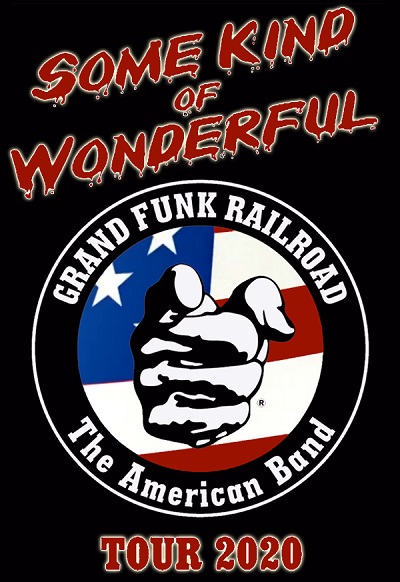
With that song, are there any plans to do any kind of special reissue? Or really anything that is Grand Funk-related, do you foresee anything coming out in the next year to maybe grab a new generation of fans or anything like that?
Yeah, we have no plans for doing any new recording. We have no plans for any new releases. Everything’s already been released, everything’s been done. Ever since Universal took over Capitol, it’s not quite the same record company that it was once was. Capital was a huge catalog record company; of course, promoting new acts, but their big deal was their catalog. Since Universal think it took over, they’re not that much interested in the catalog issues anymore. You know, of course, they like taking the money but they don’t want to really do anything to make it.
I just can’t overemphasize the fact that you guys were such an important band. Maybe you could do a feature film. I mean Bohemian Rhapsody was huge and there was a lot of drama around Grand Funk in those early days. It would make a great movie.
I would love that. I talked to a playwright — this was years ago — about putting together a story of Grand Funk Railroad, based around where we started in Flint, Michigan, and then move into the Vietnam War stuff and the influence Grand Funk had on the people at the time of the Vietnam War. Then, of course, the breakup and the Terry Knight break, ripping us off for all the money, and then we had to reinvent the band and make it. I thought, “Let’s not make a movie, but do a play. Put together a show.” I thought that would be a good project to do but it never got off the ground.
Anything could happen, right? The last time we spoke, I asked you about a reunion with Mark Farner…
(Laughs) Who? Mark who?
(Laughs)You said it was because of issues with Mark. You didn’t elaborate and out of respect I didn’t press you any further. But let me ask you this: Do you foresee any sort of possible scenario where there could be some sort of reunion? I’m sure you know reunions are really hot right now. So maybe the Rock and Roll Hall of Fame or some special event? Do you foresee that possibly ever happening?
You know and I’ve said it before — never say never. And I’ll leave it at that.
I can respect that. I know it’s a lot more complicated than what the fans know.
Well, you asked if I foresee that at the present time. No, I can’t see into the future like that. But I’ve always said the same thing — never say never.


